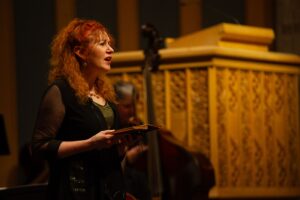Apollo’s Fire opens Chicago season with gripping, of-the-moment Handel

The Ohio-based early music ensemble Apollo’s Fire opened their third season of Chicago concerts Thursday night at Alice Millar Chapel in Evanston. As artistic director Jeannette Sorrell remarked, when they planned a year ago to begin their series with Handel’s Israel in Egypt, no one could have imagined the contemporary resonance this 1739 oratorio would have today. In her tasteful introductory reflections, Sorrell dedicated the performance to “all who are suffering in Israel and in Gaza.”
The version of Israel in Egypt presented Thursday night was Sorrell’s own 2017 retooling of Handel’s original, which was not a success at its London premiere. The composer’s version opens with an extended Lamentations, using music mostly borrowed from the funeral anthem he wrote on the death of his patron Queen Anne. The story of Exodus followed as Part II, with its plagues and the parting of the Red Sea, with Part III—“Moses’ Song”—an extended celebration of the Jews’ liberation.
A full performance runs over three hours, and Handel himself reworked the score, jettisoning the at times dirge-like Part I and adding a number of Italianate solo arias to the remaining latter two parts to appeal to 18th-century London audiences. Sorrell’s version restores Handel’s original tripartite structure, in an attempt to capture the intended dramatic arc from sorrow to jubilation, but employs enough cuts—both within movements and of entire numbers—to keep the music to 75 minutes.
The result is gripping. The familiar Biblical narrative moves along bracingly, even if one could cavil about not hearing a full complement of 10 plagues.
Like Handel’s other English Biblical oratorio Messiah, Israel in Egypt is a choral showcase, and it is hard to find enough superlatives for the performance of the Apollo’s Fire vocal forces. They met Handel’s many demands with aplomb, singing with superb pitch, balance, sweep, and diction. They were at their finest in the antiphonal chorus “The horse and his rider” that bookends Part III, vigorously blazing through Handel’s breakneck counterpoint.
While the evening belongs to the chorus, as with Messiah there are also a number of solo turns, and generally Apollo’s Fire fielded a strong lineup. Soprano Amanda Forsythe’s refulgent soprano was well-suited to Handel’s idiom, shimmering in “Though didst blow with the wind” (cleverly scored with an oboe duet). Sonya Headlam’s richer soprano blended well with Forsythe in the canonic duet “The Lord is my strength and my song,” and shone in her other solo moments.
Tenor Jacob Perry’s solo work was mostly in recitatives that move the narrative along, which he delivered with authority, and he offered a menacing rendition of “The enemy said, I will pursue.” Baritone Edward Vogel provided an evening highlight with “To God our strength, sing loud and clear,” his full, easy delivery conveying spiritual depths, and beautifully adorned with trumpet and oboe obligatti from Steven Marquardt and Debra Nagy, respectively. As often with Apollo’s Fire, the soloists also served as chorus members, moving in and out of the larger ensemble.
A conspicuous weak link was countertenor Cody Bowers, who struggled all night, his voice pale, pitchy, and unprojected. He had a memory lapse in a late aria, and actually rushed off the stage during one of the closing choral numbers. Both he and Perry were missing from the solo bows, the latter presumably attending to the former. (An Apollo’s Fire spokeswoman reported that Bowers had been feeling faint all evening, and they believe it to be a non-serious illness.) It was unfortunate that an apparently anomalous health issue impacted an otherwise unimpeachable outing, but such things of course happen in live performance.
The Exodus plagues of Part II offer some of Handel’s most ingenious textual painting. The strings leap convincingly in “The land brought forth frogs,” move from isolated drips to a swirling torrent in “He gave them hailstones for rain,” and offer guttural knife blows in “He smote all the first-born of Egypt.” Sorrell and her colleagues leaned into these effects with enormous conviction, leaving no doubt about the depictions.
The trust and mutual respect among Sorrell and her period instrumentalists were apparent throughout, with supple, responsive playing from the orchestra, and clear yet unobtrusive leadership from Sorrell herself.
Apollo’s Fire returns to Chicago with “Nights in Venice,” a program of Vivaldi, Monteverdi, and Sephardic dances, 7 p.m. November 7 at the Art Institute, and 3 p.m. November 8 at Nichols Concert Hall in Evanston. apollosfire.org
Posted in Performances



